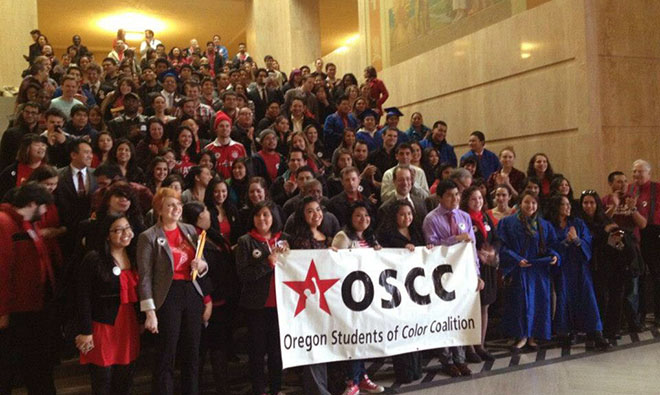Tuition equity hearts taken to the state capitol

Red hearts signify Valentine’s Day, but this year they are also part of a UCC student campaign to raise support for the tuition equity bill, this year’s H.B. 2787, currently in the Oregon legislature.
Students have been colorfully decorating the hearts at the Campus Center during the first two weeks of February in anticipation of the hearts being delivered to the state capitol in Salem on Feb. 13.
If the tuition equity bill passes, undocumented students will pay in-state tuition rates at all public Oregon universities. Currently, undocumented students have to pay out-of-state tuition rates, even if they have received their entire K-12 education in Oregon schools.
An undocumented student is defined as student who was born in another country and lacks the necessary documentation to establish their immigration status.
Many undocumented students did not come to this country on their own; they were brought here by their parents. UCC mathematics major, Miguel Rodriguez, was four years old when he came to the U.S. from Mexico. He was raised in this country, went through grades K-12 in the public school system and considers America his home.
Rodriguez is now in his second year at UCC and has found it difficult to continue his education. “I could not apply for financial aid,” said Rodriguez. His family has had to pay all his educational expenses out-of-pocket.
Rodriguez has been working toward establishing his residency, but says, “it is not an easy process.” “It can take years to get through it.”
Supporters of H.B. 2787 say the current policy hurts the state as well as students. “The State of Oregon invests a great deal in undocumented students in the K-12 system,” said Freddy Gompf, ASUCC vice president. “But because of the exorbitant out-of-state tuition rates, Oregon’s initial investment is lost. The tuition equity bill would enable undocumented students to get degrees qualifying them for higher paying jobs, thus adding more tax revenue to the Oregon state budget.”
Supporters believe Oregon’s economy would benefit in other ways as well. “Allowing undocumented workers to pay the lower rate would increase revenue collected by Oregon’s public universities,” Gompf said.
A public hearing on the tuition equity bill was held Feb. 13 at the state capitol. Gompf, who also sits on the board of the Oregon Community College Student Association, attended the hearing along with ASUCC senator Sarah Meyer. They also had the opportunity to meet with staffers from Representative Bruce Hanna’s office.
The hearing opened to a packed house. “Approx. 300 students and coalition members were in attendance,” Gompf said.
The hearing lasted two hours with citizens testifying both in support and opposition to the bill. Gompf pointed out that “most were in support of tuition equity including the president of the U of O who represented the presidents of all seven public universities.”
The bill carries with it certain stipulations. Undocumented students are required to meet the following criteria:
- attended a school in the U.S. for at least five years
- studied at an Oregon high school for at least three years
- graduated from an Oregon high school and filed an affidavit with an Oregon university indicating they have applied for citizenship or will apply as soon as eligible.
One issue with the bill is that it’s not clear how students are to demonstrate they are working toward citizenship. Fear of deportation was also an issue in court cases this fall regarding college tuition and undocumented citizens.
Opponents of tuition equity feel that people who are here illegally should not be given the same benefits as citizens born in the United States.
At a morning press conference on Feb. 11, Governor Kitzhaber publicly announced his support of the bill calling it a “long, overdue policy change.” At least three Oregon representatives and several business leaders joined with the governor in expressing their support.
For more information, go to Oregon Student Association at www.orstudents.org.
